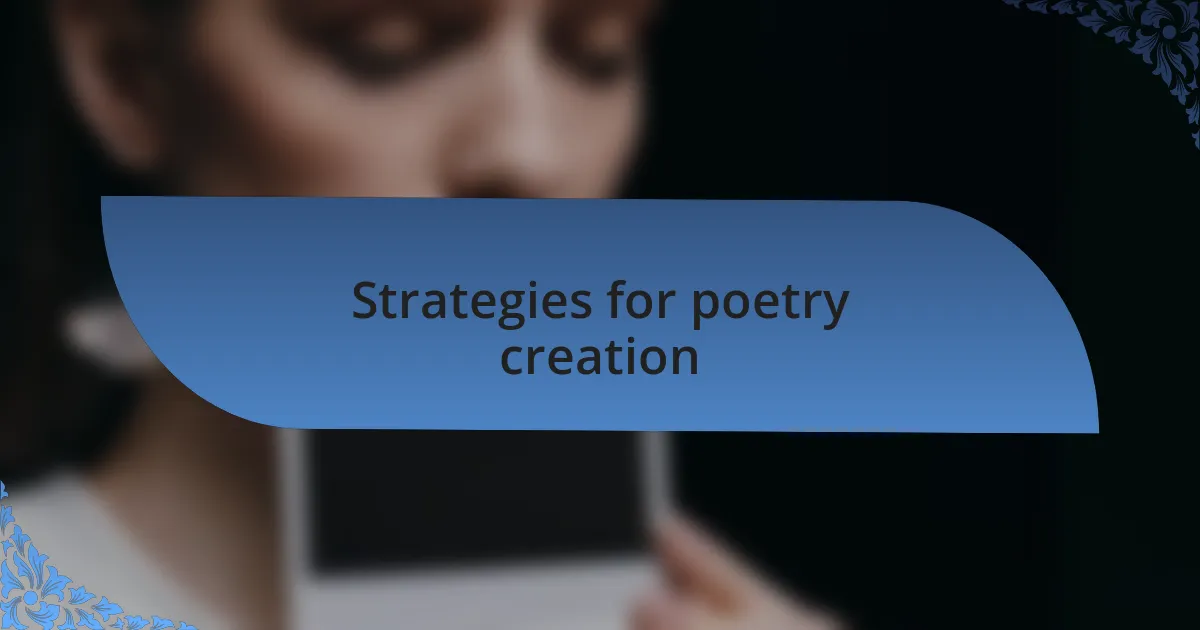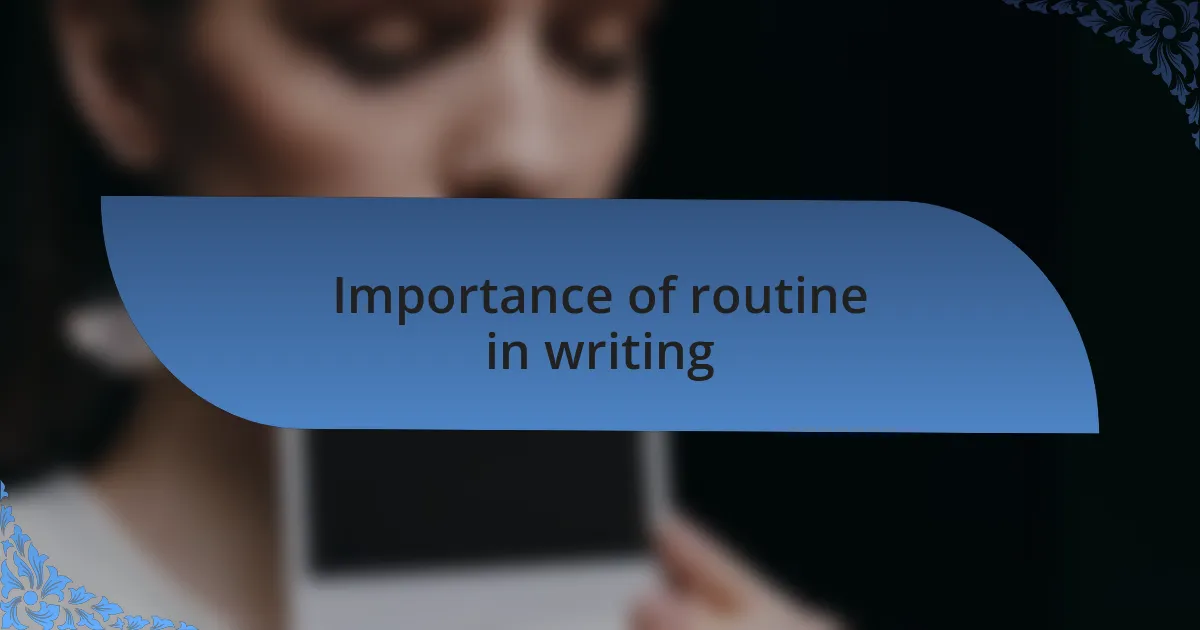Key takeaways:
- Writer’s block stems from internal conflicts, pressure of expectations, mental fatigue, and emotional turmoil.
- Techniques to overcome writer’s block include freewriting, changing environments, and engaging with writing communities.
- Establishing a routine and integrating writing rituals can enhance creativity and maintain motivation.
- Finding inspiration may involve immersing oneself in poetry events, journaling, and revisiting favorite literary works.
Understanding writer’s block
Writer’s block can feel like an insurmountable wall, trapping creativity behind a thick haze. I remember a time when I sat in front of a blank page for hours, feeling as though the words I once effortlessly spilled onto paper just vanished into thin air. In those moments, I often asked myself, “What happened to that spark I had?”
This phenomenon isn’t just a minor annoyance; it can trigger feelings of frustration and self-doubt. Recently, I faced a particularly daunting stretch where every attempt to write left me more drained. I wondered, was it fear of imperfection that kept me from writing, or was it simply the pressure to produce something profound? Understanding the root of this block can be a personal journey, uncovering fears and expectations I didn’t even realize I held.
I’ve learned that writer’s block often stems from an internal conflict between desire and expectation. For me, the trick has been to gift myself permission to write poorly. When I shifted my focus from producing a masterpiece to simply expressing myself, the words began to flow again. Have you ever considered that sometimes letting go of the need for perfection might be the key to unlocking your creativity?
Causes of writer’s block
Writer’s block often has deep-rooted causes that can take time to uncover. One significant element I’ve noticed is the pressure of expectations, whether from myself or from the audience. I recall a time when I found myself paralyzed, thinking about how each word could be judged, leading to an overwhelming fear of failing to meet those expectations. Have you ever felt that pressure choking your creativity?
Another cause that I’ve encountered is mental fatigue. There were periods when I overworked myself, trying to juggle multiple projects. The stress accumulated, leaving me staring blankly at the page. I realized that taking a break, even just a brief moment, was crucial in rejuvenating my creative spirit. Does it ever feel to you, too, like the more you push, the harder it becomes to write?
Emotional turmoil can also play a significant role in blocking my writing process. I remember times when personal issues weighed heavily on my mind, overshadowing my creativity. In those moments, the words felt distant and elusive. It’s interesting how our emotional state can directly influence our ability to express ourselves, isn’t it? Understanding these causes not only helps in identifying the barriers but also opens doors to potential solutions.
Techniques to overcome writer’s block
When I find myself facing writer’s block, I often turn to freewriting as a go-to remedy. I set a timer for ten minutes and let my thoughts spill onto the page without any judgment. It’s astonishing how liberating it feels to write without constraints. Have you ever tried this? I remember a day when I just poured out random lines about my morning coffee, and before I realized, I had sparked a poem from those musings.
Switching environments has also proven effective for me. Sometimes, simply changing my writing space can shift my mindset. Recently, I took my notebook to a local park, surrounded by the sounds of nature and people. It was refreshing! The distractions were inspiring rather than obstructive, and I ended up crafting a piece that felt vibrant and alive. Have you found that a new setting can ignite your creativity too?
Engaging with other poets or joining a writing group can be incredibly beneficial. I’ve had experiences where sharing drafts and discussing ideas led to breakthroughs that I hadn’t anticipated. I remember a workshop where a fellow writer gave me a fresh perspective on my struggles, which illuminated paths I hadn’t considered. Have you ever had a conversation that changed your approach? Such interactions not only help clarify thoughts but also build a supportive community that can lift you through those creative slumps.

Strategies for poetry creation
One effective strategy I often recommend is creating a writing ritual. When I light a candle or brew a specific type of tea before writing, it signals my brain that it’s time to dive into creativity. It might sound trivial, but I’ve noticed that establishing these little rituals can help to break the monotony and set the right mood for poetry creation. Have you ever experienced how a simple cue can transport your mind to a more creative space?
Incorporating prompts can be a game-changer for sparking inspiration. I don’t shy away from using creative challenges, like writing a poem about an object in my room. Once, I chose a faded photograph and penned a narrative poem that unexpectedly unfolded layers of nostalgia and emotion. Prompts provide a springboard, transforming what might seem mundane into something extraordinary. Have you explored how an everyday object can unlock deeper truths in your poetry?
Another strategy I find valuable is reading poetry aloud, listening to the rhythm and flow of words. There’s something about vocalizing the lines that brings a different energy to the piece. I often read my favorite poets, and I’m continually amazed at how their cadence influences my own writing style. Have you taken the time to let the sound of poetry inspire your own? This simple act often leads to unexpected bursts of creativity and fuel for new ideas.

Importance of routine in writing
Routine plays a pivotal role in my writing practice, often acting as a quiet guide. I’ve found that setting a specific time for writing each day creates a rhythm that my mind and body come to respect. Do you remember the comfort of a familiar routine? It’s like having a trusted friend by your side, nudging you into a creative state.
There were days when I struggled to find inspiration, but maintaining a consistent schedule became my anchor. When I commit to writing in the early morning, the world feels still and my thoughts flow more freely. Have you ever noticed how solitude can enhance your creative process? That quiet time fosters reflection and allows ideas to blossom without interruption.
Additionally, my routine includes regular breaks, which might seem counterintuitive but are essential for maintaining motivation. I’ve discovered that stepping away for a few minutes to stretch or take a walk can reset my mind, often leading to bright ideas when I return. How often do you give yourself permission to take a breather? This balance between discipline and relaxation creates a fertile ground for inspiration to grow.
Personal experiences with writer’s block
Writing can sometimes feel like climbing a mountain with writer’s block as the steepest part. I vividly remember a phase when even the simplest words eluded me, turning my thoughts into a tangled web. During those frustrating moments, I found myself staring at a blank page, wondering if my creativity had abruptly vanished. Have you ever experienced that crushing silence where ideas seem just out of reach? It’s disheartening, and yet, it’s a common experience that we all encounter.
One time, I sat at my desk for hours, hoping inspiration would strike. Instead, I found myself doodling more than writing, struggling with a sense of defeat. It was then that I decided to change my scenery. I took my notebook to a nearby café, surrounded by the hum of chatter and the rich aroma of coffee. Sometimes, a fresh environment sparks new ideas and shakes off the monotony. Have you ever noticed how a shift in your surroundings can ignite your imagination?
There’s also an emotional rollercoaster tied to writer’s block that not many talk about. The self-doubt creeps in like an unwelcome guest, whispering, “What if you can’t create anything worthwhile?” I recall moments when I had to remind myself that it’s okay to write imperfectly. Embracing the process rather than obsessing over the outcome often helps to dissolve those intimidating barriers we face. It’s a vital lesson in self-compassion; have you embraced your imperfections in creativity? The journey itself becomes the story worth telling.

Tips for finding inspiration
Finding inspiration often requires a bit of experimentation. I remember a time when I decided to immerse myself in the world of poetry readings. Attending these events, surrounded by passionate creators, filled me with energy and new perspectives. Have you ever felt a shift in your creativity just from listening to someone share their work? It’s incredible how the rhythm of words from others can spark your own.
Another method I’ve relied on is keeping a journal solely for snippets of thoughts, phrases, or images that catch my attention throughout the day. One afternoon, I was struck by a fleeting moment in the park—a child laughing as they chased bubbles. That simple observation turned into a poem about innocence and freedom. It reinforced my belief that inspiration is often hidden in everyday experiences. What small moments have inspired you lately?
Sometimes, I find that revisiting my favorite pieces of literature can reignite my creative flame. I recall reading a poem that deeply resonated with me and prompted a wave of my own ideas. This act of reflection offers a gentle reminder of the beauty and power of language. Have you considered the influence of your favorite authors on your own writing? Their unique voices can guide you back to your own, reminding you of the stories waiting to be told.